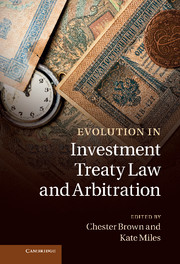Book contents
- Frontmatter
- Contents
- Contributors
- Editors' preface and acknowledgements
- Table of cases
- Table of Treaties
- Part I Introduction
- Part II Shifts in fundamental character
- Part III Actors in international investment law
- Part IV The new significance of procedure
- 15 The new rules on participation of non-disputing parties in ICSID arbitration: Blessing or curse?
- 16 The role of procedure in the development of investment law: The case of Section B of Chapter 11 of NAFTA
- 17 Navigating the parallel universe of investor–State arbitrations under the UNCITRAL Rules
- 18 The scope of ‘amount of compensation’ dispute-resolution clauses in investment treaties
- 19 Interference by a local court and a failure to enforce: Actionable under a bilateral investment treaty?
- 20 Bias challenges in investor–State arbitration: Lessons from international commercial arbitration
- Part V Engagement with cross-cutting issues
- Part VI Conclusions
- Index
- References
20 - Bias challenges in investor–State arbitration: Lessons from international commercial arbitration
from Part IV - The new significance of procedure
Published online by Cambridge University Press: 05 December 2011
- Frontmatter
- Contents
- Contributors
- Editors' preface and acknowledgements
- Table of cases
- Table of Treaties
- Part I Introduction
- Part II Shifts in fundamental character
- Part III Actors in international investment law
- Part IV The new significance of procedure
- 15 The new rules on participation of non-disputing parties in ICSID arbitration: Blessing or curse?
- 16 The role of procedure in the development of investment law: The case of Section B of Chapter 11 of NAFTA
- 17 Navigating the parallel universe of investor–State arbitrations under the UNCITRAL Rules
- 18 The scope of ‘amount of compensation’ dispute-resolution clauses in investment treaties
- 19 Interference by a local court and a failure to enforce: Actionable under a bilateral investment treaty?
- 20 Bias challenges in investor–State arbitration: Lessons from international commercial arbitration
- Part V Engagement with cross-cutting issues
- Part VI Conclusions
- Index
- References
Summary
Introduction
Bias challenges are part of everyday life in international commercial arbitration (ICA). ICA lawyers are now very sophisticated in their use of challenge as a means of delaying proceedings and denying the other side the arbitrator of its choice. There are various causes and effects of this phenomenon, but on balance it seems that the rate of bias challenge in ICA has increased for mostly economic reasons: from the perspective of the aspiring arbitrator, bias challenges are a valuable weapon against the cartel of ‘grand old men’ (and women) who get most of the appointments as arbitrators; and bias challenges have a retail aspect in that, from the client's perspective, they are a procedural device that can be deployed with great effect. There are therefore aspects of ‘generation conflict’ and ‘supply and demand’ to bias challenges in ICA.
Experience has shown that investor–State arbitration (ISA) is not immune to these forces. There has been a gradual increase in the rate of bias challenge in ISA proceedings in recent years. Examples of bias challenges in ISA can be found in challenge decisions under the Convention on the Settlement of Investment Disputes between States and Nationals of other States, such as Amco Asia v. Indonesia, Vivendi Universal v. Argentina, Suez v. Argentina, Generation Ukraine v. Ukraine, and Zhinvali Development v. Georgia. The challenges in these cases were all predicated upon either relationships between the arbitrator and a party or its counsel, or the arbitrator's apparent preference for one party over the other. These two broad sets of facts make up what can be called the ‘common garden variety’ of bias challenges in ICA. In the sense that most of the reported cases have been of the common garden variety, the pattern of bias challenges in ISA reflects the experiences of lawyers and arbitrators in ICA.
- Type
- Chapter
- Information
- Evolution in Investment Treaty Law and Arbitration , pp. 445 - 482Publisher: Cambridge University PressPrint publication year: 2011
References
- 3
- Cited by



